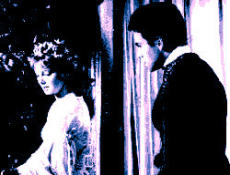Film Review
Riccardo Freda, an Italian filmmaker best known for his lurid horror
films, would seem to be an unusual choice to direct a screen version of
Shakespeare's
Romeo and Juliet,
but his visual flair and love of action (evident in his big budget
peplums) allows him to offer a distinctive telling of a familiar
story. Like Franco Zeffirelli in his far better known
1968 adaptation, Freda
cast two young actors to play the star-crossed lovers - Geronimo
Meynier (in his final film role) and Rosemary Dexter - although both
actors lack the talent and maturity to make their characters entirely
convincing. Beautifully shot on location for the most part,
Romeo e Giulietta is a sumptuous
visual feast throughout, and the film opens with a dramatic action
sequence that would have been worthy of a big budget western. As
in Zeffirelli's more lavish production, music is an essential
ingredient of the film, and pieces by Rachmaninoff and Tchaikovsky
provide an effective complement to the lush images. By
compressing the story to its barebones, Freda offers an original
interpretation of
Romeo and Juliet
that is fast-moving, colourful and intense, although it lacks the
passion and poignancy of Zeffirelli's film.
© James Travers 2013
The above content is owned by frenchfilms.org and must not be copied.
Film Synopsis
In 15th century Verona, the rival houses of Montague and Capulet are
locked in a deadly feud, which even the city's ruler is powerless to
end. At a banquet, Romeo Montague meets and falls instantly in
love with a young woman named Juliet, whom he later discovers is
Capulet's daughter. Knowing that their parents will forbid their
marriage, Romeo and Juliet wed in secret, but their happiness does not
last long. Once Romeo has killed Juliet's brother Tybalt in a
duel, he is banished from Verona. When Juliet learns that her
father has arranged for her to marry the nobleman Paris she turns to
Friar Laurence, hoping that he will procure for her a fatal
nostrum. The friar gives Juliet a drug that will feign the
appearance of death and sends a messenger off to notify Romeo of his
plan. The messenger is unable to reach Romeo, and when the latter
hears of his beloved's death he has but one thought, to end his
days...
© James Travers
The above content is owned by frenchfilms.org and must not be copied.



